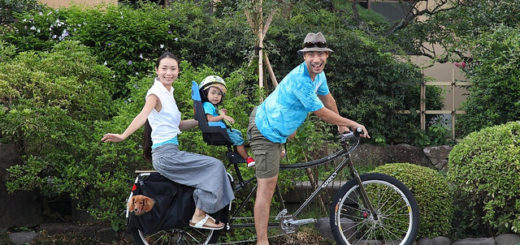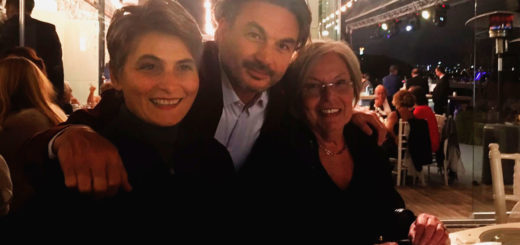Interview On a National ‘Awareness In Families’ Campaign
When Gülşah Çökmez, Dinçer Coşkun and their friends were asked to create a campaign for their course on Public Relations at Selçuk University in Konya, the land of Rumi, they chose to organise a national family awareness campaign. They wanted to communicate that awareness in families would be the best bridge for a good future. They asked my help about how they could formulate a way for increasing awareness in families and how children could be placed in such an endeavour.
They thought about getting their campaign under the umbrella of Turkish Republic’s Ministry of Family and Social Politics, perhaps creating an institution teaching Family Awareness. They thought there could be a phone line helping families with their kids. Their target group is families with 0-12 year olds. These families can be listed in collaboration with the Registrar’s Office. Families might be sent leaflets and booklets about how to approach their kids according to their ages. There would also be events parents are going to be invited on a regular basis.
These institutions could, perhaps, be opened in all the large cities of Turkey.
At this point the students needed the ideas of professionals and posed the following questions to me:
Why do you think Turkey needs the concept of Aware Families?
I like your idea of Aware Families. There is this assumption that if the family members know about child development and the effect of their behaviour on this development their attitudes towards each other will reflect this knowledge.
We all discover in time that nothing is as clearly separated into boxes of right and wrong. What might appear to be very wrong from our perspective now may be just the right thing for a given situation.
We know that traditional families have plenty of love for their kids together with control. However this love is conditional, expecting from the child grateful obedience and servile, sometimes in the guise of respect. Children are encouraged not to question, to think of the family interest above their own and to avoid conflict. Curiosity and taking initiative are discouraged. What do we think of this?
I am aware that Turkey is a multicultural society and every family has a right to perpetuate its own culture and values through their offspring.
As a family therapist, however, I am in a position to observe the harmful effects of certain common child rearing practices on the new generation. They become more problematic as the nuclear family becomes more the norm. Maybe in a large family organisation the child’s attachment is more spread and problematic child rearing practices do not have damaging effects. But in nuclear families the child falls through the gap without having a sibling available who can hold and support them emotionally.
I identify ‘Humiliating, Comparing, And Criticising’ as the three most common harmful behaviours. Of course physical and verbal violence are the ultimate humiliations.
Many parents are unaware that individuals who struggle with such problems as alcohol and drug abuse, obsessions, exam anxiety or panic attack are raised by parents who regularly commit these mistakes. Even though awareness does not always lead to behavioural change, it is a start.
How can we bring the Aware Families idea into family life?
Families are dynamic systems attempting to balance two forces. One force pulls towards change in order to evolve; the other one is pulling to remain the same to protect its identity. These two forces are present when the family is interacting with their environment, exchanging information. Whether we notice or not the families change all the time in a similar way to a tree stretches out roots to find water, and turns its leaves toward the sun.
Systems replicate aspects of a larger holographic universe. Families reflect the general hierarchical and patriarchal nature of our society. In attempting to make a positive impact one has to approach very diligently to act from outside the habitual ways, and so avoid doing more of the same. For example It would be very easy to find yourself in a conflict with parents in a similar way parents are with their kids. You may be passionate but you still need to resist the temptation to use fear or shame in order to influence parents’ behaviour towards their children, however harmful they may appear to be.
In order to bring change we need to look at the larger systems in which families function. If we can think from the outside of the system, then, we may have a chance to communicate at a level we can make a difference. And this is only possible from a respectful position.
What would be the consequences for the future when families do not try to understand their children and do not treat them as individuals?
When family culture is such that what matters is performing well in relation to social expectations parents do not value understanding their children. This makes psychologists like me very busy, because these children tend to be very unhappy kids and later, adults who may suffer from addictions, panic attacks and fears. They do not know how to make themselves happy, simply because they do not know what they want.
This would not be a problem if we were not living in a world where they are required to make informed decisions all the time. This inability of the families to prepare their children for what is ahead, this unpreparedness that creates the problem for the young adults.
How do you think the concept of the family evolved historically in Turkey?
Pre-islamic family was nomadic. Even though men had the power and authority in the family hierarchy, men and women were participating equally in social as well as family matters.
During the Ottoman period family was the main attachment for the individual; all problems were expected to be solved in the family. It consisted three generation living under the same roof, sharing child rearing responsibilities. Elderly were looked after in the family. Each member was expected to contribute to the family economics from an early age. Relationships with the community and neighbours were close, they were considered like an extension of the family.
During the republic period westernisation meant that the number of nuclear families settled in the cities increased. Today more than 70% of the population live in cities as opposed to 24% in late 1920’s. This change I think we are still trying to adapt.
We want to help kids to think the right and wrong for themselves rather than being frightened of their families. How can we achieve that?
I agree it is a very valuable aim. We live in a fear based culture. It is perpetuated at different levels of the society. You can start with yourselves by evaluating information that comes to you critically independent of the power of its source or whatever the implications of thinking differently than the majority.
As a young person I know you have ideals you to which you aspire and that is wonderful. I would like to give you a way of keeping this sense of commitment in the face of disappointments you will undoubtedly experience on your way. That is persistence in believing that change is a slow process and you can only contribute to this process through being aware of your own Self, your own fears, your own aggression, your own darkness.
You need to understand that we are all connected, judging anybody or any behaviour is not recognising, making yourself blind to it in yourself. When you face your own demons the way to help those kids to think for themselves will naturally reveal itself.
How can we define the concepts of aware family and aware child?
Families with awareness will have the knowledge as well as the emotional maturity to treat their children according to their ages, abilities and nature. On the other hand unaware families do not value understanding their children so much as kids are seen more like a member of’ family self’, subject to traditional expectations and social norms. For example I know mothers who control their daughters through their grimaces in public, reminding them to behave in certain prescribed ways.
Aware families would encourage their children to make their own choices and take responsibility of their behaviour. Less aware families either force their children to think and act like them or do not engage at all in helping them make informed choices.
Aware families raise aware children. These kids know their limits. They confidently explore who they are and what they want.





